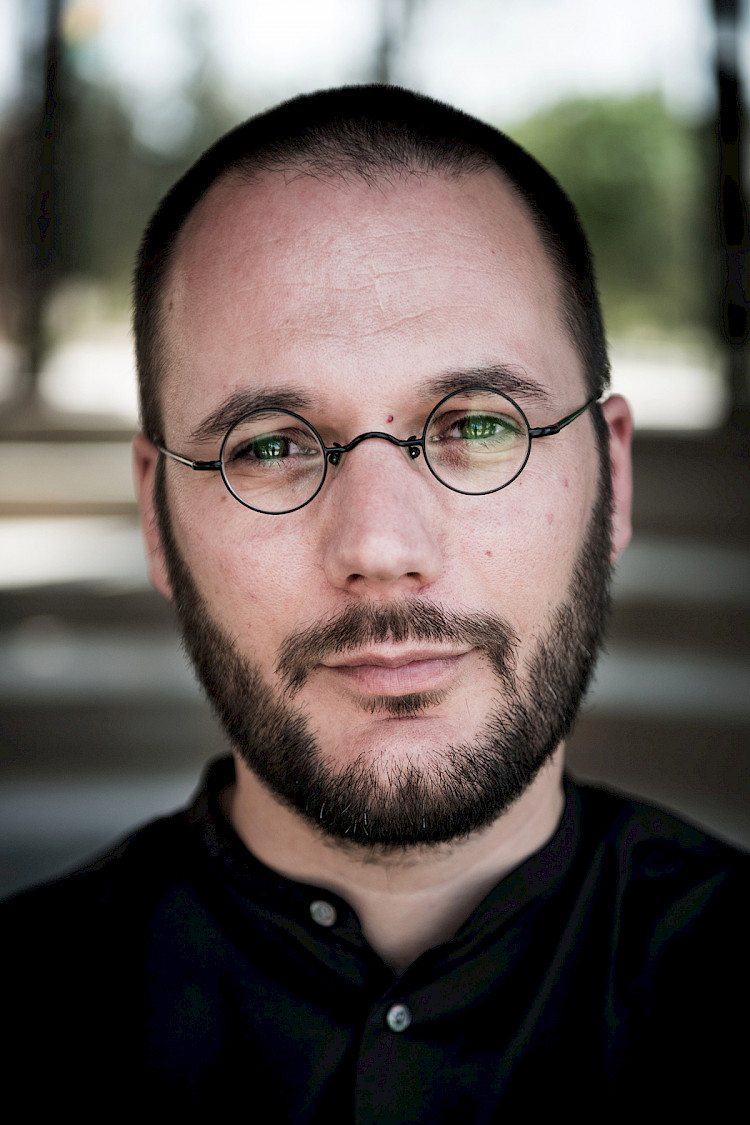Jonas Staal
Kollaborateur*in
What do you learn primarily in theater?
In popular language, theater represents mimicry. When someone says that someone is “making a theater” or “being theatrical”, it relates to exaggeration or even to falsehood. But for me, theater denotes the perpetual performance we are all implicated in. A way to understand the script of racial capitalism, the stage of extraction and consumption, the performance of the ruling classes. Theater is not unreal, rather, it makes visible the tools through which reality is staged and provided legitimacy. Emancipatory theater then, relates to reclaiming the means of production of script, stage and performance, to ensure the construction of egalitarian realities and a biosphere for all.
How do you relate to plants, animals and algorithms?
From a perspective of emancipatory theater, an important question is who can appear, who is entitled to recognition and speech, when it comes to the actors that partake in the construction of a given reality. In racial capitalism, most of us are off-script: so-called cultural Marxists, womxn, the working and precarious classes, Black people and people of color, the disabled, the Indigenous, LGBTQI+ communities, the undocumented and stateless. The script, stage and performance of racial capitalism is monopolized by ruling elite and a futureless future of ecosystem collapse. That counts the same for other-than-human actors. An emancipatory theater constructs reality in which comradeship extends to plants, animals, and even to algorithms. But for an algorithm to become a comrade, we must reclaim tech giants under common ownership and governance. The means of production of script, stage and performance need to be fundamentally transformed. Part of our work as artists and cultural workers, I think, is to shape the imaginary of that egalitarian reality. To create a different world, we need to imagine it first.
Is a revolution necessary?
All emancipatory forms of art and culture emerged through revolution and political transformation. To construct egalitarian reality – the biosphere for all – it is not just necessary, but inevitable.
In which idea you stay devoted to?
I am an artist and a propaganda researcher. The history of the term propaganda is itself subject to propaganda. Today, the dominant conception is that propaganda emerged from dictatorship and represents by definition mass manipulation and misinformation. But there is a long history of thinking propaganda as an emancipatory practice, from socialist revolutions to anti-colonial struggle, Black liberation, civil rights, feminist and ecological movements. This lineage represents a collective propagation that refuses to legitimize the oppressive mechanisms of the world that exists, but aims to make a world of many worlds instead. A propagation of possibility, a propagation of becoming more if we are able to break with the manufactured consent of racial capitalism. I remain devoted to this notion of an emancipatory propaganda, of which emancipatory theater is a part.
Biography
Jonas Staal is a visual artist whose work deals with the relation between art, propaganda, and democracy. He is the founder of the artistic and political organization New World Summit (2012–ongoing). Together with Florian Malzacher he co-directs the training camp Training for the Future (2018-ongoing), and with human rights lawyer Jan Fermon he initiated the collective action lawsuit Collectivize Facebook (2020-ongoing). With writer and lawyer Radha D’Souza he founded the Court for Intergenerational Climate Crimes (2021-ongoing) and with Laure Prouvost he is co-administrator of the Obscure Union.
Exhibition-projects include Art of the Stateless State (Moderna Galerija, Ljubljana, 2015), After Europe (State of Concept, Athens, 2016), The Scottish-European Parliament (CCA, Glasgow, 2018) and Museum as Parliament (with the Democratic Self-Administration of Rojava, Van Abbemuseum, Eindhoven, 2018-ongoing). His projects have been exhibited widely at venues such as the Stedelijk Museum in Amsterdam, M_HKA in Antwerp, Moderna Museet in Stockholm and the Nam June Paik Art Center in Seoul, as well as the 7th Berlin Biennale, the 31st São Paulo Biennale and the 12th Taipei Biennale.
Publications include Nosso Lar, Brasília (Jap Sam Books, 2014), Stateless Democracy (With co-editors Dilar Dirik and Renée In der Maur, BAK, 2015), Steve Bannon: A Propaganda Retrospective (Het Nieuwe Instituut, 2018) and Propaganda Art in the 21st Century (The MIT Press, 2019). Staal completed his PhD research on propaganda art at the PhDArts program of Leiden University, the Netherlands.

